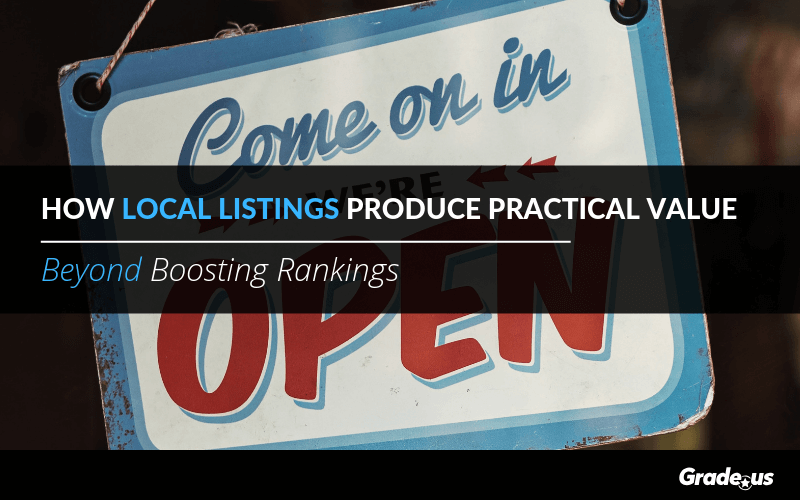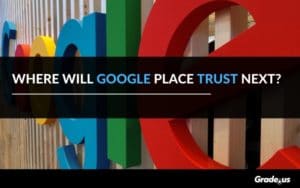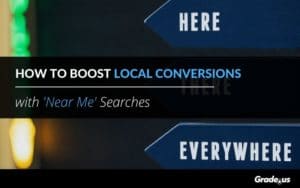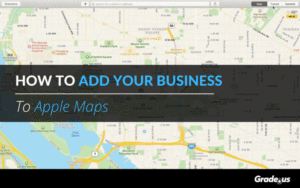Can local listings produce substantial top-line growth?
They absolutely can. Some experts believe local listings have limited value. However, in the right hands, local listings are powerful tools you can use to drive a steady flow of traffic to your business.
It just takes a bit of consistent effort.
The good news? Most of the work is frontloaded and there’s an emphasis on eliminating waste in the form of conversion leakage. It’s an easy way to score quick wins.
Does conversion leakage come from poor citations and local listings?
I know how this sounds. It sounds as if I'm blowing the issue of the local listings way out of proportion. Local search have already marketers stated that local citations don't matter, that it doesn't produce any appreciable lift in conversions or performance.
There's an easy way to test this.
We test this with our online reviews. As I've mentioned previously, a strong online review portfolio produces a significant conversion boost. Research studies from Reevoo, Harvard University and Northwestern University all show that positive reviews boost conversions.
As much as 270 percent!
What does this have to do with your online citations and the impact they have on your overall conversion rate? Quite a bit. Several experts state that, in the context of rankings, those online citations have little to no value. In that sense, they're right.
Does this mean citations and local listings are worthless?
Far from it, left unchecked, citations and local listings can be an unexpected source of conversion leakage. Don't take my word for it, see for yourself.

Lcee, a customer at a local restaurant/store, went to the store to make a purchase, only to find that the hours posted by store owners was incorrect. When she held store owners accountable, they treated her badly.
Here's another example.
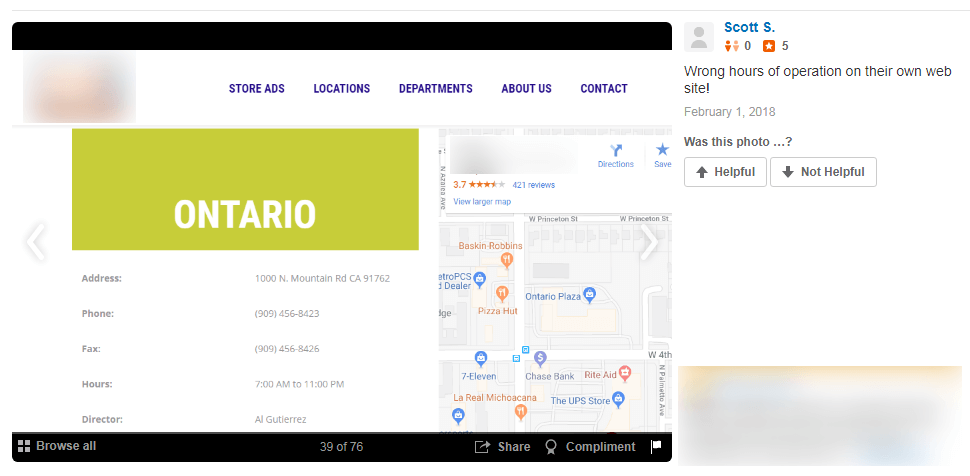
And another.
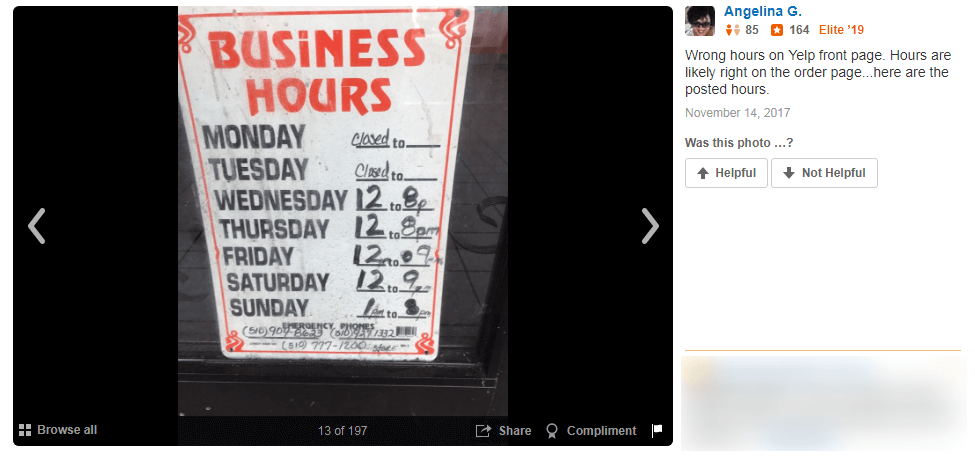
Using search operators site:yelp.com AND "wrong number" or site:yelp.com AND"wrong address" we see several examples we can reference to reinforce these points. You could repeat this for any number of well-trafficked review sites, in any niche, industry or category and the results would be the same.
What does this tell us?
While citations aren't as crucial from a rankings standpoint, they're essential if your organization focuses on conversions or cash flow.
That's every business, right?
A deeper dive into these examples shows us that there are some real yet difficult to measure consequences that come from neglecting our citations.
- Negative reviews from unhappy or dissatisfied customers (which decreases future conversions)
- Losing online traffic due to poor aggregate reviews displayed in the search results
- Losing 21.9% to 69.9% of prospective customers due to poor aggregate results
- A decrease in customer goodwill and an increase in negative sentiment
- A decrease in offline foot traffic due to poor citation or inaccurate NAP data
- Lost business due to prospective customers losing interest, giving up, selecting a competitor, etc.
That's the problem with conversion leaks.
They often seem insignificant on their own. These issues quietly erode conversions and cash flow for local businesses. Several experts have mentioned that there isn't enough data to demonstrate the significance of citations. Here's what Miriam Ellis at Moz had to say about citations.
"Our industry still hasn’t conducted large enough studies to prove exactly what impact citations have on rankings, and so I don’t consider that a weighty selling point of management. There have been numerous small studies, but a modern, big data study over a lengthy time frame would be great to see. It would need to take so many factors into account (competition, linked unstructured citations, duration, etc.). In the meantime, citations continue to have obvious practical value as business assets, which I’ve briefly touched on above but could expand on for pages!"[emphasis added]
She's absolutely right.
Ellis absolutely nails it. If you're focused on using citations to boost rankings, that's probably not a great place to start. There are plenty of other more important areas to focus your campaign resources. From a general business standpoint, good citations management is good business.
Here's why.
Here's a quick recap of the four phases in the buying process.
1. Awareness is a broad term. It encapsulates the myriad ways you can say "I exist" to your customers. Awareness could be a billboard branding campaign, educational content, and generic data, your location or contact info.
2. Attraction triggers a "tell me more" impulse in customers. Customers visit due to a combination of factors - your offers, presentation, risk reversals, values, etc. These customers aren't yours yet, but they're open to hearing what you have to say.
3. Conversion. The "I want it" impulse. You've connected all the dots. Customers are ready to take action whether that's a subscription, sale, opt-in, sign-up or registration for an event. Your customers are willing to do whatever it is you've asked them to do.
4. Consumption. Your customers are eating or consuming what you've offered. They're using your product, taking advantage of your service, asking questions about the results they've achieved from using your product, etc.
Poor citations impact conversion and consumption negatively. Take a look at this review of a ZocDoc dentist.

This patient scheduled an appointment using a third party service (ZocDoc). Their dentist gave them the wrong address, so they're late for their appointment. They came anyway. How many customers would go out of their way to figure this out?
Not many.
Poor citations make it difficult for customers to pay for your product or service; difficult for customers to use what you're offering. It's another barrier local providers can't afford.
Using citations and local listings to boost marketing performance
As experts have pointed out, citations probably won't boost your rankings. We've also seen that there are significant downsides (i.e., cash flow leakage) to poor citation management. What about the upsides? Is there a way to achieve consistent benefits with good citation management?
Absolutely, but it depends on your goals.
If you're aware of your goals and the strengths or weaknesses of your local platform, you can tweak the effectiveness of your local citations. First, let's take a look at the various types of local platforms available.
- Mainstream local platforms: This includes local, social and review oriented sites (e.g., Google My Business, Yelp, Facebook, etc.). These mainstream platforms produce the lion’s share of traffic for local businesses.
- Industry-specific platforms: Your specialty or niche platforms (e.g., Avvo for lawyers, TripAdvisor for hospitality, ZocDoc for healthcare, etc.) these typically are well known in a particular industry.
- Geo-targeted platforms: This refers to your rotary clubs, chamber of commerce, meetups and networking groups. These are region-specific organizations and platforms that provide businesses with citation data.
- The wide web: This is a broad category that includes a variety of producers – government websites, news mentions, blogs, apps and publishers.
Next, here are a few ways you can improve citation and local listings management.
1. Create a series of offers. The sky's the limit here. You can use time-sensitive offers, order limits, deal of the day, bonuses, etc. Your offer should have four specific ingredients to increase effectiveness - appeal, exclusivity, urgency, and a promise. It's a good idea to create an annual offer calendar. The weekly, monthly, quarterly, and annual offers you plan to offer.
2. Create a set of tracking/vanity numbers. You can match your vanity numbers to a specific platform (i.e., Yelp), or a specific offer (e.g., buy one, get ones, order limits, discounts, or sales). Numbers that are easy to remember (i.e., 800-400-4343) may be appropriate to use. Use these numbering conventions with care as they may be perceived as spam depending on your industry.
3. Create a customized set of landing page(s). It's ideal if you have a rotating set of landing pages and offers you can use with your profiles on various platforms. Each landing page should include the same ingredients you've used to create a strong offer - appeal, exclusivity, urgency, and a promise. Include objections (which you defuse), risk reversals, social proof, and uniqueness to boost conversion rates dramatically.
4. Use your tracking/vanity numbers. Add your platform or offer specific tracking numbers to your local, search, and review profiles. Are you featured in a local publication or news site? If it's appropriate and relevant (e.g., a podcast or radio interview) to include any of the offers in your site, do so. Call these special offer numbers out in your profiles and offers, so customers are conditioned to pay attention.
5. Track your results, improve your performance. Providers like CallTrackingMetrics or RingBoost are effective ways to manage and track each number. You’ll want to lean on listings management tools like Grade.us if you’re looking to automate or track your listings monitoring at scale. With their new listings monitoring feature, you can track your Google My Business, Facebook, Yelp, CitySearch, and YP.com listings.
They’re also adding more top directories and industry-specific review sites on an ongoing basis.
If you go the extra mile and integrate your analytics and call tracking data, you’ll have the intel you need to improve the performance of your listings over time.
What if you'd prefer to keep things simple?
If you're not looking to put your citations to work, you can use a local listings monitoring tool to ensure your data is accurate across each of your local, social, review, and niche profiles. Make sure your data is accurate and precise, however you choose to use them.
Just don't ignore your local listings.
Use citations and local listings to reduce conversion leaks
If you're looking for a sure-fire way to boost your organic search rankings, citations and local listings won't deliver results. That doesn't mean your citations or local listings are useless. On the contrary, they will work hard for your business, if you'll let them.
Local listings require monitoring and supervision.
When they're ignored, they can be an unexpected source of conversion leakage; they produce an exceptional amount of value in the right hands. While citations and local listings aren't as crucial from a rankings standpoint, they're essential if your organization is focused on conversions or cash flow.
That's basically every business.
That's why this is such great news. With the right structure and a little bit of attention, your citations and local listings will become the surprise hit your customers are already looking for.
About the Author
Andrew McDermott
Andrew McDermott is the co-founder of HooktoWin. He shows entrepreneurs how to attract and win new customers.

